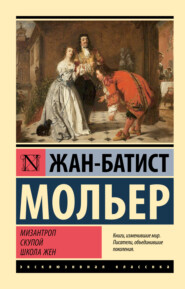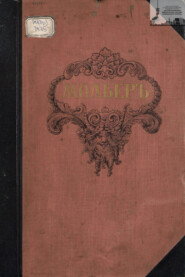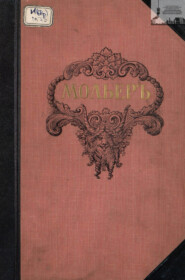По всем вопросам обращайтесь на: info@litportal.ru
(©) 2003-2024.
✖
The Pretentious Young Ladies
Год написания книги
2017
Настройки чтения
Размер шрифта
Высота строк
Поля
E'en let him take it, and make much of it.
Whilst, in The Pretentious Young Ladies, Mascarille and Jodelet impose upon two provincial girls, in Bury-Fair, La Roch, "a French peruke-maker" succeeds in deceiving Mrs. Fantast and Mrs. Gertrude under the name of Count de Cheveux. The Count is very amusing, and though a coward to boot, pretends to be a great warrior. His description of war is characteristic; he states that "de great Heros always burne and kille de Man, Woman, and Shilde for deir Glory."
DRAMATIS PERSONAE
LA GRANGE, \) repulsed Lovers. DU CROISY, /
GORGIBUS, a good citizen.
[Footnote: Gorgibus was the name of certain characters in old comedies.
The actor, L'Epy, who played this part, had a very loud voice; hence
Molière gave him probably this name.]
THE MARQUIS DE MASCARILLE, valet to La Grange.
[Footnote: Mascarille was played by Molière, and has a personality quite distinct from the servant of the same name in the Blunderer and the Love-Tiff. The dress in which he acted this part, has not been mentioned in the inventory taken after his death, but in a pamphlet, published in 1660, he is described as wearing an enormous wig, a very small hat, a ruff like a morning gown, rolls in which children could play hide-and-seek, tassels like cornucopise, ribbons that covered his shoes, with heels half a foot in height.]
THE VISCOUNT JODELET, valet to Du Croisy.
ALMANZOR, footman to the pretentious ladies.
TWO CHAIRMEN
MUSICIANS
MADELON, daughter to Gorgibus, \) The pretentious young ladies. CATHOS, niece to Gorgibus, /
MAROTTE, maid to the pretentious young ladies.
LUCILE. \) two female neighbours. CÉLIMÈNE. /
SCENE – GORGIBUS' HOUSE, PARIS
ACT I
SCENE I. – LA GRANGE, DU CROISY
DU. CR. Mr. La Grange.
LA. GR. What?
DU. CR. Look at me for a moment without laughing.
LA. GR. Well?
DU. CR. What do you say of our visit? Are you quite pleased with it?
LA. GR. Do you think either of us has any reason to be so?
DU. CR. Not at all, to say the truth.
LA. GR. As for me, I must acknowledge I was quite shocked at it. Pray now, did ever anybody see a couple of country wenches giving themselves more ridiculous airs, or two men treated with more contempt than we were? They could hardly make up their mind to order chairs for us. I never saw such whispering as there was between them; such yawning, such rubbing of the eyes, and asking so often what o'clock it was. Did they answer anything else but "yes," or "no," to what we said to them? In short, do you not agree with me that if we had been the meanest persons in the world, we could not have been treated worse?
DU. CR. You seem to take it greatly to heart.
LA. GR. No doubt I do; so much so, that I am resolved to be revenged on them for their impertinence. I know well enough why they despise us. Affectation has not alone infected Paris, but has also spread into the country, and our ridiculous damsels have sucked in their share of it. In a word, they are a strange medley of coquetry and affectation. I plainly see what kind of persons will be well received by them; if you will take my advice, we will play them such a trick as shall show them their folly, and teach them to distinguish a little better the people they have to deal with.
DU. CR. How can you do this?
LA. GR. I have a certain valet, named Mascarille, who, in the opinion of many people, passes for a kind of wit; for nothing now-a-days is easier than to acquire such a reputation. He is an extraordinary fellow, who has taken it into his head to ape a person of quality. He usually prides himself on his gallantry and his poetry, and despises so much the other servants that he calls them brutes.
DU. CR. Well, what do you mean to do with him?
LA. GR. What do I mean to do with him? He must … but first, let us be gone.
SCENE II. – GORGIBUS, DU CROISY, LA GRANGE
GORG. Well, gentlemen, you have seen my niece and my daughter. How are matters going on? What is the result of your visit?
LA. GR. They will tell you this better than we can. All we say is that we thank you for the favour you have done us, and remain your most humble servants.
DU. CR. Your most humble servants.
GORG. (Alone). Hoity-toity! Methinks they go away dissatisfied. What can be the meaning of this? I must find it out. Within there!
SCENE III. – GORGIBUS, MAROTTE
MAR. Did you call, sir?
GORG. Where are your mistresses?
MAR. In their room.
GORG. What are they doing there?
MAR. Making lip salve.
GORG. There is no end of their salves. Bid them come down. (Alone). These hussies with their salves have, I think, a mind to ruin me. Everywhere in the house I see nothing but whites of eggs, lac virginal, and a thousand other fooleries I am not acquainted with. Since we have been here they have employed the lard of a dozen hogs at least, and four servants might live every day on the sheep's trotters they use.
SCENE IV. – MADELON, CATHOS, GORGIBUS
GORG. Truly there is great need to spend so much money to grease your faces. Pray tell me, what have you done to those gentlemen, that I saw them go away with so much coldness. Did I not order you to receive them as persons whom I intended for your husbands?
MAD. Dear father, what consideration do you wish us to entertain for the irregular behaviour of these people?
CAT. How can a woman of ever so little understanding, uncle, reconcile herself to such individuals?
Whilst, in The Pretentious Young Ladies, Mascarille and Jodelet impose upon two provincial girls, in Bury-Fair, La Roch, "a French peruke-maker" succeeds in deceiving Mrs. Fantast and Mrs. Gertrude under the name of Count de Cheveux. The Count is very amusing, and though a coward to boot, pretends to be a great warrior. His description of war is characteristic; he states that "de great Heros always burne and kille de Man, Woman, and Shilde for deir Glory."
DRAMATIS PERSONAE
LA GRANGE, \) repulsed Lovers. DU CROISY, /
GORGIBUS, a good citizen.
[Footnote: Gorgibus was the name of certain characters in old comedies.
The actor, L'Epy, who played this part, had a very loud voice; hence
Molière gave him probably this name.]
THE MARQUIS DE MASCARILLE, valet to La Grange.
[Footnote: Mascarille was played by Molière, and has a personality quite distinct from the servant of the same name in the Blunderer and the Love-Tiff. The dress in which he acted this part, has not been mentioned in the inventory taken after his death, but in a pamphlet, published in 1660, he is described as wearing an enormous wig, a very small hat, a ruff like a morning gown, rolls in which children could play hide-and-seek, tassels like cornucopise, ribbons that covered his shoes, with heels half a foot in height.]
THE VISCOUNT JODELET, valet to Du Croisy.
ALMANZOR, footman to the pretentious ladies.
TWO CHAIRMEN
MUSICIANS
MADELON, daughter to Gorgibus, \) The pretentious young ladies. CATHOS, niece to Gorgibus, /
MAROTTE, maid to the pretentious young ladies.
LUCILE. \) two female neighbours. CÉLIMÈNE. /
SCENE – GORGIBUS' HOUSE, PARIS
ACT I
SCENE I. – LA GRANGE, DU CROISY
DU. CR. Mr. La Grange.
LA. GR. What?
DU. CR. Look at me for a moment without laughing.
LA. GR. Well?
DU. CR. What do you say of our visit? Are you quite pleased with it?
LA. GR. Do you think either of us has any reason to be so?
DU. CR. Not at all, to say the truth.
LA. GR. As for me, I must acknowledge I was quite shocked at it. Pray now, did ever anybody see a couple of country wenches giving themselves more ridiculous airs, or two men treated with more contempt than we were? They could hardly make up their mind to order chairs for us. I never saw such whispering as there was between them; such yawning, such rubbing of the eyes, and asking so often what o'clock it was. Did they answer anything else but "yes," or "no," to what we said to them? In short, do you not agree with me that if we had been the meanest persons in the world, we could not have been treated worse?
DU. CR. You seem to take it greatly to heart.
LA. GR. No doubt I do; so much so, that I am resolved to be revenged on them for their impertinence. I know well enough why they despise us. Affectation has not alone infected Paris, but has also spread into the country, and our ridiculous damsels have sucked in their share of it. In a word, they are a strange medley of coquetry and affectation. I plainly see what kind of persons will be well received by them; if you will take my advice, we will play them such a trick as shall show them their folly, and teach them to distinguish a little better the people they have to deal with.
DU. CR. How can you do this?
LA. GR. I have a certain valet, named Mascarille, who, in the opinion of many people, passes for a kind of wit; for nothing now-a-days is easier than to acquire such a reputation. He is an extraordinary fellow, who has taken it into his head to ape a person of quality. He usually prides himself on his gallantry and his poetry, and despises so much the other servants that he calls them brutes.
DU. CR. Well, what do you mean to do with him?
LA. GR. What do I mean to do with him? He must … but first, let us be gone.
SCENE II. – GORGIBUS, DU CROISY, LA GRANGE
GORG. Well, gentlemen, you have seen my niece and my daughter. How are matters going on? What is the result of your visit?
LA. GR. They will tell you this better than we can. All we say is that we thank you for the favour you have done us, and remain your most humble servants.
DU. CR. Your most humble servants.
GORG. (Alone). Hoity-toity! Methinks they go away dissatisfied. What can be the meaning of this? I must find it out. Within there!
SCENE III. – GORGIBUS, MAROTTE
MAR. Did you call, sir?
GORG. Where are your mistresses?
MAR. In their room.
GORG. What are they doing there?
MAR. Making lip salve.
GORG. There is no end of their salves. Bid them come down. (Alone). These hussies with their salves have, I think, a mind to ruin me. Everywhere in the house I see nothing but whites of eggs, lac virginal, and a thousand other fooleries I am not acquainted with. Since we have been here they have employed the lard of a dozen hogs at least, and four servants might live every day on the sheep's trotters they use.
SCENE IV. – MADELON, CATHOS, GORGIBUS
GORG. Truly there is great need to spend so much money to grease your faces. Pray tell me, what have you done to those gentlemen, that I saw them go away with so much coldness. Did I not order you to receive them as persons whom I intended for your husbands?
MAD. Dear father, what consideration do you wish us to entertain for the irregular behaviour of these people?
CAT. How can a woman of ever so little understanding, uncle, reconcile herself to such individuals?

















